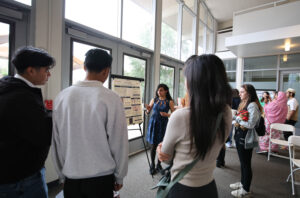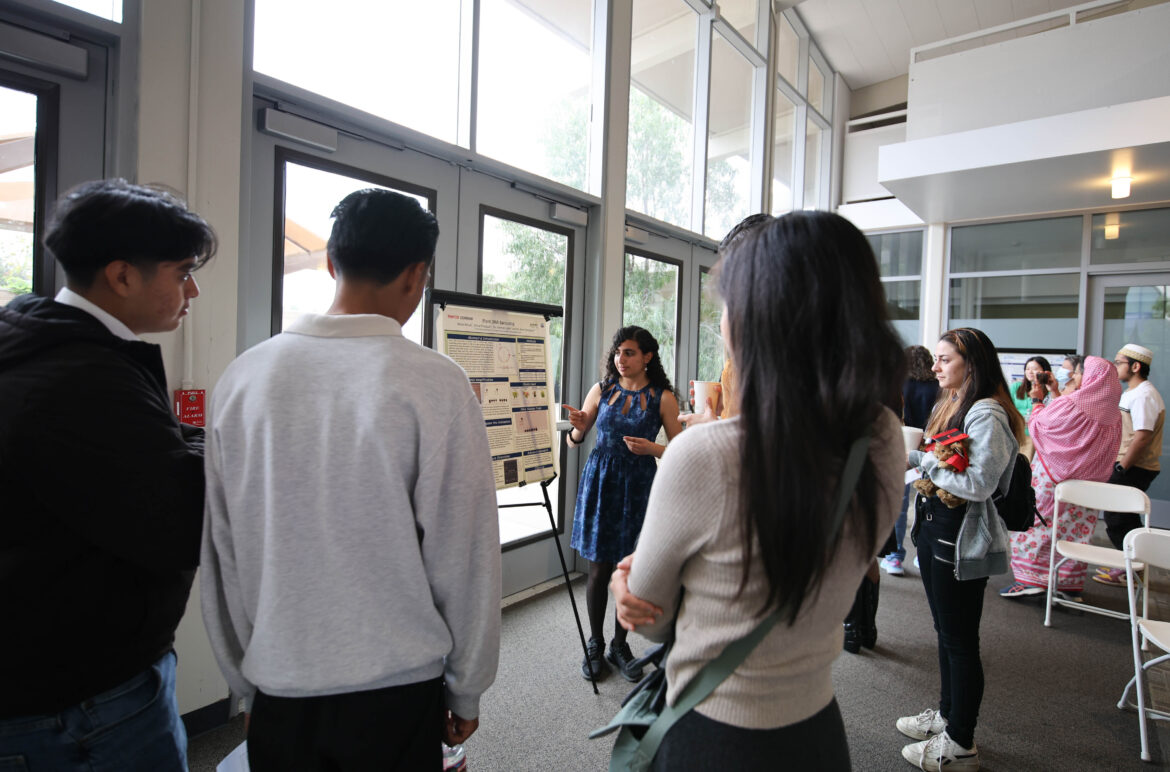Students and visitors entering Building 600 on June 1 would later leave with newfound knowledge of plant and soil science, DNA barcoding and protein biomanufacturing, courtesy of research work by students at Pierce College and local high schools.
At the 2nd Annual Biotechnology Student Symposium, Director of the ASPIRE Biotech Program Aron Kamajaya welcomed the audience and thanked them for supporting the students before introducing the keynote speaker—Guillermo “Willie” Zuñiga, emeritus president of Grifols Biological, a company that works with plasma protein therapies.
“My intention is a free-for-all type of platform where students can showcase their work and then people can come,” Kamajaya said. “There are some people from industry, from academia, some faculty from CSUN, business leaders and our keynote speaker is the former president of Grifols Biologicals. Hopefully giving a unique experience for our students.”
Once Zuñiga took the stage, he began his talk by discussing his upbringing and career background. Zuñiga’s 43-year career began with an entry-level manufacturing technician position at Alpha Therapeutic, which was later acquired by Grifols.
“I had no idea that they manufactured these amazing therapies that will have huge positive impacts on very sick patients,” Zuñiga said. “A job and a paycheck soon turned into an amazing career. Who knew that I would spend the next 43 years saving lives in the same community that I grew up in.”
After getting married and having a daughter at a young age, Zuñiga quit university—where he had a full-ride scholarship at Pomona College—for a job, but later became motivated to continue higher education, returned to California State University, Los Angeles and worked five and a half years to get a business degree.
“You’ll see that a number of different positions require at least an associates degree, some companies may have different requirements, but in general, associates degrees,” Zuñiga said. “And then you’ll see that a number of the higher level jobs require at least a bachelor’s degree. Many of our employees will start off as technicians, continue their education, do what I used to do—run across the street to Cal State LA. And nothing made me feel better than to see individuals get their degree and then get promoted to that next level. Amazing, a great feeling.”
Three “Lightning Talks” about student research projects were presented, each about 10 minutes. Mathew Kostoglou spoke about “Nutrient Availability and Microbial Diversity: A Symbiotic Relationship,” Ruqaiyah Nagarwala and Alissa Perez presented on “Discovering Novel Gas Vesicle Genes” and Matthew Vardanyan discussed “Reverse Engineering a qPCR Master Mix.”
Vianney Poot, a student at Reseda Charter High School, first signed up for the ASPIRE internship program last November and presented the poster, “Engineering a Lyo Formulation for Crude Taq Extract.”
“Not everyone has access to Taq Polymerase,” said Poot, explaining it is used for DNA amplification. “It can lose functionality over time depending on how it gets transported and everything. So my goal in the project was I wanted to freeze dry the Taq, so that it can be transported easily [and] it can survive through really freezing temperatures or really hot temperatures. I haven’t done that yet—to see if it can withstand really extreme temperatures—but right now was just trying to [see] if it can freeze dry.”
Of the 19 community colleges in Los Angeles County, 14 of those have programs in biotech, Zuñiga told attendees at the closing of his speech.
“This is an amazing industry,” Zuñiga said. “And I want to make sure you understand that it is all about the patients. This is so much more than a job or a career. If you’re interested in this industry, you need to realize that it comes with an obligation to improve the quality of life for others.”
For Kamajaya, it was important to host an event that is accessible to high school and community college students.
“When I’m looking back, I didn’t have any of these opportunities,” Kamajaya said. “That is why I think giving back to the community, the students, to have this opportunity, hopefully I can prepare them for what’s coming in a job.”





